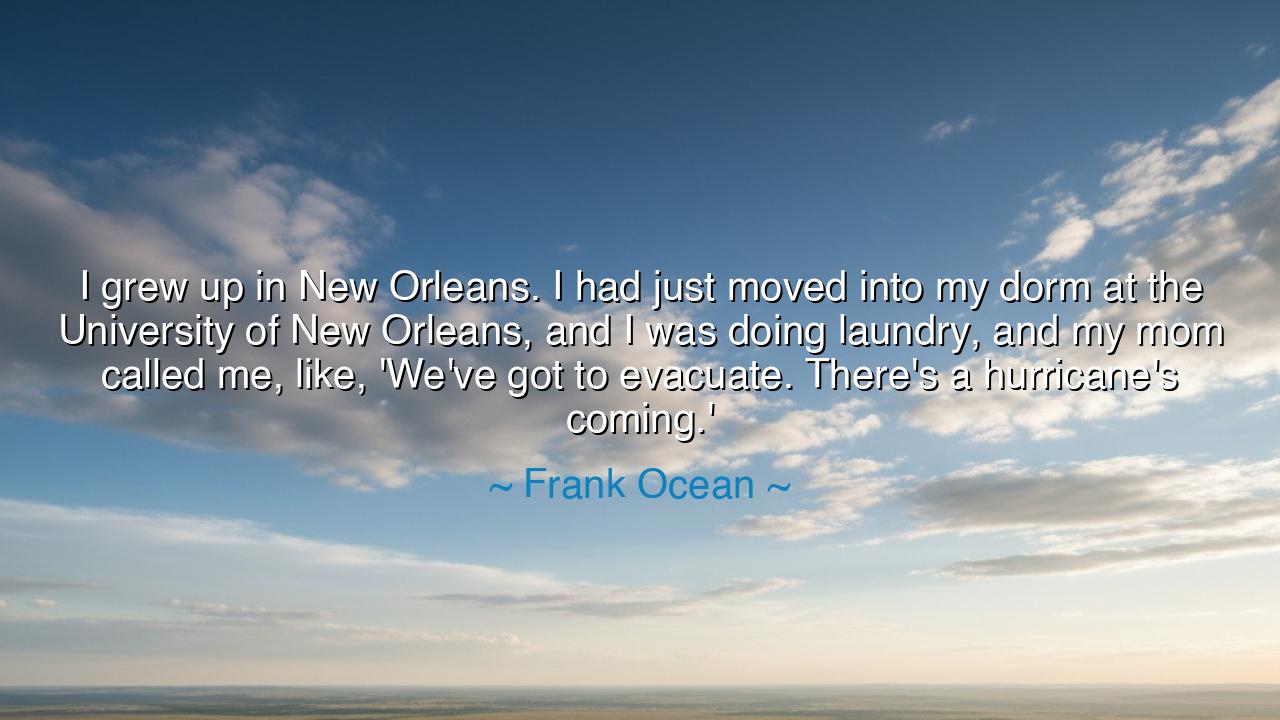
I grew up in New Orleans. I had just moved into my dorm at the
I grew up in New Orleans. I had just moved into my dorm at the University of New Orleans, and I was doing laundry, and my mom called me, like, 'We've got to evacuate. There's a hurricane's coming.'






When Frank Ocean said, “I grew up in New Orleans. I had just moved into my dorm at the University of New Orleans, and I was doing laundry, and my mom called me, like, ‘We’ve got to evacuate. There’s a hurricane’s coming,’” he was recalling a moment that would alter not just his life, but the course of a generation’s spirit. This was the call before Hurricane Katrina, the storm that tore through the Gulf in 2005, leaving behind ruin, exile, and silence where laughter once lived. Yet within these few words, Ocean reveals not just catastrophe, but awakening — the end of childhood and the beginning of understanding. In this small, ordinary scene — a young man doing laundry — life itself shifts, as nature reminds him that even the strongest roots can be washed away.
To the ancients, storms were never random. They were messages of transformation, the gods’ way of shaking mankind awake from complacency. And so it was for Frank Ocean. In his calm recollection lies a memory of powerlessness, but also of resilience. The mother’s voice — urgent yet steady — carries not only warning but love. It is the eternal archetype of the mother as protector, the one who senses danger before it strikes. In this way, his story becomes a parable: that even as the world collapses, love remains the first and last shelter.
New Orleans itself is a city steeped in myth, music born from pain, laughter surviving amid loss. It is a place where jazz was forged from sorrow, and community rose from struggle. When the waters came, they did not just destroy homes; they scattered a culture, a rhythm, a way of life. For Frank Ocean, whose music would later blend soul, melancholy, and grace, the storm became part of his voice. It taught him the impermanence of safety and the necessity of creation. Like the ancient bards who sang of floods and exiles, Ocean turned devastation into melody. In the winds that tore through his city, he found the first notes of his truth.
We may recall the story of Noah, who built an ark not out of fear, but out of faith. The flood consumed the old world, but from it emerged a new covenant, a new beginning. In the same way, the young Ocean — uprooted from his home — began a journey of rebirth. What he lost in place, he found in purpose. Displacement gave him vision; survival gave him empathy. His music, like Noah’s rainbow, became a promise — that even after the waters, beauty can be born again. Thus, tragedy became not an end, but an initiation into depth, awareness, and art.
There is something profoundly human in that simple detail: “I was doing laundry.” It reminds us that life’s turning points rarely announce themselves with thunder. They come quietly, in moments of routine, when we least expect them. One instant, we are folding clothes; the next, we are running for our lives. This is the way of the world — fragile, fleeting, ever-changing. Yet from this fragility arises gratitude, the understanding that nothing is guaranteed. To live is to stand in the path of storms and still choose to build again when they pass.
In his mother’s call, we hear the voice of ancestral wisdom — the call that has echoed through generations of families before disaster. “We must leave,” she says, and behind those words lie centuries of intuition, of mothers and fathers who carried their children away from danger, not knowing what awaited beyond. It is this thread of care that binds humanity through time. The storm may change its name — Katrina, Harvey, or another yet to come — but the essence of survival remains the same: love, courage, and endurance.
The lesson, dear listener, is clear: life will summon storms, both of nature and of fate. When they come, remember that evacuation is not defeat — it is wisdom. The one who leaves to live will one day return to rebuild. From Frank Ocean’s story, we learn that even exile can give birth to art, that pain can deepen the soul’s resonance. Do not curse the floods that sweep away your certainties; they may be clearing space for your true voice to rise.
So hold these words close: your world may wash away, but not your essence. When the storm calls, listen — not with fear, but with faith. For even as the waters rise, there will always be a voice — like the voice of Frank Ocean’s mother — calling you home, guiding you toward safety, and reminding you that love is the one shelter no wind can destroy.






AAdministratorAdministrator
Welcome, honored guests. Please leave a comment, we will respond soon